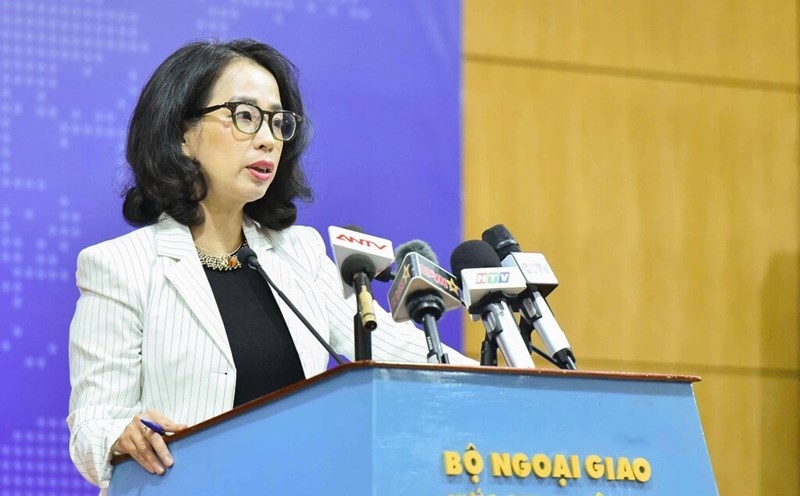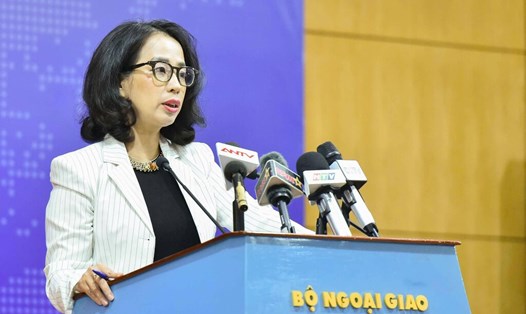Ms. Nguyen Thi Binh held the position of Head of the Delegation of the National Liberation Front of South Vietnam, later the Provisional Government Delegation of the Socialist Republic of Vietnam. She is the only woman to sign the Paris Agreement.
The negotiations leading to the signing of the Paris Agreement took place at a roundtable and were attended by 4 parties: the US, Saigon government, the National Liberation Front of South Vietnam, and the Democratic Republic of Vietnam.
The negotiations began in 1968 and ended on January 27, 23. The negotiations began in three months. For nearly 5 years, it has been a fierce "general offensive" of Vietnam on many fronts at the same time, from politics, military to diplomacy.
For the Paris Agreement to be signed on January 27, 1973, the battlefield has escalated fiercely, with countless blood and bones poured down from the Southern Laos Road 9 campaign, Quang Tri ancient citadel to the heavy rain of US B-52 bombs falling on Hanoi... Each military war is exchanged for advantages at the peace negotiation table.
War and peace
During more than 4 years of negotiations to sign the Paris Agreement, the period of struggling, postponing - backing with many American plots. In order to gain the advantage on the negotiating table, the US and the Saigon government poured troops into the battlefield, making the wars taking place in 1971 - 1972 the most fierce history in history.
Director - Lieutenant Colonel Dang Thai Huyen of the Army Cinema is in the process of completing the war film "Red Rain" about the ancient citadel of Quang Tri with the battle of 81 days and nights of the hot summer in 12.
The female director said that when reading documents, meeting witnesses, meeting veterans to hear about the red summer fire in the ancient city, she almost haunted. In particular, there is a sentence written in a document, when coming to the ancient city, please go lightly, because the soil in the ancient city is the blood of martyrs.
"There are twenties into Waves", every story about the battle in the ancient citadel of Quang Tri in 1972 has become a legend because of the fierceness of the war fighting every meter of land.
At the end of 1972, the US sent B-52s to attack Hanoi. After 12 days and nights of fierce resistance, many American aircraft were shot down and were likened to the heroic "Dien Bien Phu in the air battle" of the Hanoi army and people.
The US B-52 airstrike on Hanoi has angered international public opinion. In the memoir of former Vice President Nguyen Thi Binh, she emphasized the especially important role of international public opinion, of neighboring countries, and of the peace-loving American people themselves. It is the support of international public opinion that has helped negotiations on ending the war and restoring peace in Vietnam progress more and more smoothly.
On December 30, 1972, under the pressure of international public opinion, combined with the fierce resistance of our army and people, the US was forced to unilaterally declare a ceasefire on bombing the North and propose to resume negotiations in Paris.
Ms. Nguyen Thi Binh recounted in her memoir that the diplomatic delegation participating in the negotiations in Paris always adheres to the principle of "foreign cooperation with the battlefield". Military advantages give the diplomatic delegation to negotiate the Paris Agreement in France more strength.
For more than 4 years (nearly 5 years) pursuing the "longest negotiations in history", the diplomatic delegation of the National Liberation Front of South Vietnam, and the Democratic Government Delegation of the Republic of Vietnam always enlisted the international public opinion, meeting the international press to talk about the righteous struggle of the Vietnamese army and people against the US and American invasion forces.
According to statistics, the negotiations lasted 4 years, 8 months and 14 days, through 201 public meetings, 45 high-level private meetings, 500 press conferences, and thousands of interviews.
In addition to participating in the negotiations, Ms. Nguyen Thi Binh and the diplomatic delegation of the National Liberation Front of South Vietnam and the Government of the Democratic Republic of Vietnam visited many countries to continue to clarify the situation of the ongoing war in Vietnam.
At the end of 1972, the United States failed military. The United States and henchmen also understood that they were bogged down in this war, they could not win, unable to break the will of the army and people of Vietnam. The United States was forced to sit back at the negotiating table, signing the Paris Agreement in January 1973.
The Paris Agreement on ending the war and restoring peace in Vietnam sets out the following basic contents: Requiring the US to end the war, withdraw troops for 2 months, maintain political status, the 3-component Ethnic Rehabilitation Council...
Ms. Nguyen Thi Binh recounted that when she signed the Paris Agreement on January 27, 1973, she was extremely moved.
Signing the historic Paris Agreement, I was deeply moved. Thinking to compatriots, comrades, to friends in both the North and the South... When I remember those who are no longer there to know about this event, I shed tears (mentoring my family, friends and country).
That day, the Kleber Conference Room - where the signing ceremony of the Paris Agreement was bright. In front of the conference, thousands of Vietnamese people - overseas Vietnamese, French friends, countries - waving diplomatic delegations of the Government of the Democratic Republic of Vietnam, the Provisional Revolutionary Government of South Vietnam (formerly the delegation of the National Liberation Front of South Vietnam), the cheering cheering in the golden flag of golden stars, brilliant.
Sacred history
To know what peace is worth, what peace is beautiful, let's look at history. In the peace we have today, we always need moments of gratitude to history.
As writer Nguyen Truong Quy said, "History creates prestige, creates a brilliant beyond, creates a brand for a country, a people". The history of the years of building and defending the country heroically has always been the pride of each generation.
April 30, 1975 became a great milestone when history turned to page, the country was peaceful and unified. That day was recorded in history as the moment the whole nation burst into tears, the flags and flowers covered the sky, the whole world joined in joy, sending congratulations mixed in wonder.










